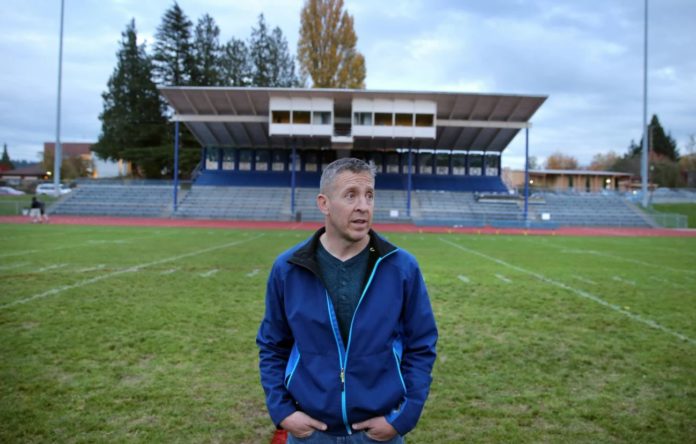The United States Supreme Court heard arguments on Monday in the case of an American football coach who is seeking the right to pray in the middle of the field after his high school team’s games. The conservative majority on the court could use the case to broaden the restrictions on religious expression in public schools.
Joseph Kennedy was inspired to start praying after high school football games after watching Facing the Giants, a 2006 film about a coach at a tiny religious academy who led his team to a state football title after praying and emphasizing Christian ideals to his players.
Despite having no experience playing American football, Mr. Kennedy was considering taking a job as a coach at a high school in Bremerton, Washington, a town near Seattle. His wife worked for the school district, and he was hired because of his experience as a US Marine, when he dabbled in the sport.
He accepted the job and, for the following seven years, he prayed on the field after games, sometimes alone, sometimes with players, with no fanfare or controversy.
That changed after an opponent coach informed the Bremerton school principle about his behavior during a game in September 2015. Mr. Kennedy was advised by the school that his prayers could be interpreted as a school endorsement of religion, which would be in violation of a long line of US Supreme Court decisions restricting religious activity in public schools.
Mr. Kennedy refused, and the school placed him on leave following a post-game prayer that became a public and media spectacle, with a mob of spectators gathered on the field surrounding the coach.
Instead of seeking to renew his one-year coaching contract with the school at the end of the season, he sued Bremerton for infringing on his constitutional right to freedom of religion, and went on a countrywide media tour to make his case.
And so started a six-year legal struggle that pits multiple sections of the US Constitution’s First Amendment – which protects free speech and religious expression while simultaneously prohibiting the state’s “establishment” of a religion – against one another.
Mr. Kennedy’s counsel argued during Monday’s Supreme Court oral arguments that he was merely a private citizen who wanted to be permitted to display his own religious beliefs after his official obligations as a coach had ended. In violation of his constitutional rights, the Bremerton school district was punishing him for his beliefs and exercising his right to free speech.
Mr Kennedy’s acts, according to Bremerton’s counsel, were more than private prayer; they were disruptive group demonstrations held on school grounds, which might have a coercive effect on students and athletes of various religious beliefs.
During nearly two hours of proceedings, the court’s nine justices interrogated the two lawyers, repeatedly posing hypothetical instances to discover the limits on what the two sides thought appropriate religious display in a public school context.
Sonia Sotomayor, one of the more liberal justices, wondered if a teacher may read the Bible or pray aloud before or after class. Mr. Kennedy’s lawyer stated that he believed she could. Clarence Thomas, a conservative justice, questioned Bremerton’s lawyer on whether a coach kneeling in protest during the national anthem qualifies as government-endorsed speech. He stated that it might be possible.
Would a coach who made the sign of the cross with his players on the field be subject to school sanctions, Justice Brett Kavanaugh (a conservative) wondered? Bremerton’s attorney answered no, as long as the coach did not become the “center of attention.”
The Supreme Court has traditionally defended church-state separation
When it comes to thorny problems of constitutional rights and safeguards, Supreme Court justices frequently draw legal lines like this, and this case is likely to be no exception. Given the tone of the conservative justices’ questions, however, it is likely that the court will side with Mr. Kennedy to some extent. The question is whether the court will go so far as to overturn previously set limits on religious speech in public schools.
And they go back decades, as Maryland Democratic Congressman Jamie Raskin, who filed a Supreme Court brief in support of Bremerton in this case, pointed out in a post-argument press conference.
“As long as there are pop math quizzes, there will be prayer in the public schools,” he said. “The point is that employees of the school and officials of the school cannot engage in prayer and then try to get other peoples to participate, because that clearly violates the separation of church and state.”
In 2000, a 6-3 majority of the Supreme Court found that a student-led prayer broadcast over the school’s public address system before a high-school football game was an unlawful government endorsement of religion. In 1992, a 5-4 majority of the Supreme Court ruled that a clergy-led graduation prayer was inherently coercive and hence unconstitutional.
Lemon v. Kurtzman, a landmark religious establishment case from 1971, declared that laws must have a “secular legislative purpose” and established a three-part test to assess if they passed constitutional muster.
Although the more conservative Supreme Court has essentially abandoned the “Lemon test” in favor of increased compassion for laws that allow or even facilitate religious expression, it has not been expressly invalidated. In the Bremerton case, the court could do so – or even overrule more recent legal rulings.
Conservative proponents of religious liberty are advocating for just such a measure.
“Religious liberty isn’t a right to be weird in the corner,” said Lori Windham, senior counsel with the Becket Fund for Religious Liberty, after Monday’s arguments. “It’s a right to bring the deepest, most important truths to public life”.
That appears to be a sentiment shared by many Supreme Court justices, as seen by the fact that the ruling, in this case, is expected later this spring.
Image Credit: Getty
You were reading: US Supreme Court hears case of HS football coach fired for on-field prayer
